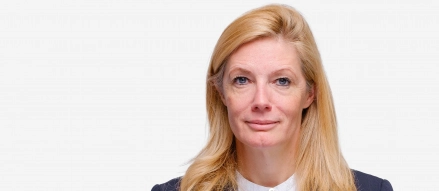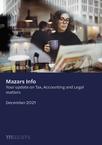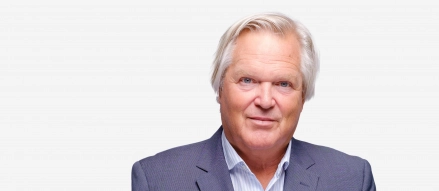
Mazars Info December 2021
PERSONAL INCOME TAX
Belgian special tax status – new landscape
In our newsletter of November, the upcoming changes and requirements for the new Belgian special tax status were already highlighted, albeit briefly. Based on the preliminary texts of the Belgian tax authorities and the draft bill of the Council of Ministers, which was approved on 29 October 2021, we can already reveal that the existing special tax regime will be replaced by a more contemporary regime. The limited duration of the tax benefits, the minimal remuneration threshold and the ‘30%-rule’ are the most profound changes.
The existing special tax regime, which remains valid until 31 December 2021, was not linked to a specific period of time.
Time limitation
As of 1 January 2022, the new expat (under the new special tax regime applicable as of 1 January 2022) can only benefit from the regime for a 5-year period. This period can be extended with 3 years after submitting a new request – after 5 years – that demonstrates that the conditions are still met. Changing employers during the 5-year period (or 8 years, if extended), has no impact on the duration of the special tax status hence why the ultimate duration of the Belgian special tax status is limited to 8 years.
Minimum salary requirement
Next, for most qualifying employees or directors, a minimum gross salary of EUR 75.000,00 is required to be eligible for the new Belgian special tax status. This gross salary includes the vacation payment, year-end premium, benefits in kind and bonusses. Note that this salary threshold is not required for researchers as the general condition here is that they need to proof that they have a specific degree (e.g. Master) or minimum 10 years relevant working experience. An important addition is that, during a period of 60 months prior to the
start of the assignment in Belgium, the expat may not have lived in a city that was located less than 150 km from the Belgian border. This means that individuals, living in the north of France, Luxemburg and part of The Netherlands and Germany will in principle not be eligible to apply for the Belgian special tax status.
New tax exemption instead of the tax free allowances
The well-known “tax free allowances” of EUR 11.250,00/29.750,00, covering costs proper to the employer, are replaced by a tax exemption of maximum 30% (with a cap of EUR 90.000,00). Obviously, the cap makes it less attractive for senior executives who earn more than EUR 300.000,00 (excluding cost proper to the employer based on the new special tax regime).
In addition, specific costs proper to the employer can still be reimbursed tax free by the employer (i.e. costs for relocation to Belgium, decorating the house and tuition fees for children/partner). Important remark is that only the costs for decorating the house are capped to a maximum amount of 1 month rent paid for the housing accommodation).
Abolishment ‘foreign travel exclusion’
A last radical change is that the so-called ‘foreign travel exclusion (i.e. exemption of the salary for working days outside Belgium)’ will no longer exist since expats living in Belgium will be considered as Belgian resident taxpayers. Consequently, they will be taxable on their worldwide income. As a sidenote, the condition of being a Belgian non-resident, is no longer required. As such, a Belgian resident, who meets all conditions, is also eligible for the Belgian special tax status.
Transition period
A new tax regime asks for a transition period. The transition period creates the opportunity for expats and their employers to either step into the new regime or do nothing. In case the taxpayer, who meets all necessary conditions, opts to do nothing, (s)he can still benefit from the Belgian tax and social security benefits of the existing special tax regime up until 31 December 2023. As of 1 January 2024, he will become a Belgian resident taxpayer who is no longer entitled to any benefit relating to the Belgian special tax status. Next to that, a taxpayer, who meets all necessary conditions, can decide to ‘opt-in’ into the new regime by filing an application request prior to 30 June 2022.
The years that already passed, as being subject to the Belgian special tax status, will be deducted from the 5-year period.
It is clear that the new regime will redraw the expatriate landscape in Belgium and will have an impact on the expatriate profiles coming to Belgium. One can argue that the new regime, announced by the Belgian tax authorities as a budgetary measure, is no longer attractive for expats to work in Belgium. Next, the new special tax regime will need to be compared to the existing regimes in the neighbouring countries to determine whether it will be attractive enough. These questions and more details will be clarified once the tax law will be published and the first applications will have been filed.
If you have an expatriate policy in place or expats coming to Belgium in the pipeline, we recommend to contact your contact our Global Mobility department to determine the best approach.
VAT
Latest news
1. UPDDATE -- VAT exemption of transport services directly related to export of goods
In our last newsletter we have informed you that the Authorities have published a Circular Letter 2021/C/96 based upon the Court Decision of the ECJ in the ‘L.C.’ IK case.
The ECJ has ruled that a direct link between the transport services and the export of goods doesn’t only mean that the transport services have made the export happen BUT that these transport services were also directly executed on behalf of the exporter or recipient of the goods.
The Circular Letter points out which consequences this ruling has for the Belgian VAT code. It states that the exemption of transport services can only be applicable if the transport services are performed on behalf of the:
- The supplier or customer of the exported goods;
- The owner, lessee or lessor of the exported goods;
- The factoring company exporting the goods for reparation, factoring or customization;
- The person re-exporting the goods which he had on trial;
- The person re-exporting the goods which he has repaired, factored or customized.
In case the transporter or freight forwarder subcontracts the transport, this transport service cannot be exempted.
Today we can inform you that the application of This Circular Letter has been postponed until 1 April 2022.
2. New rules on the rental of furnished accommodation
With a new draft law on various VAT provisions, the Belgian legislator wants to create more legal certainty about the situations in which hotel services are taxed with VAT (‘provision of furnished accommodation’), instead of an exempted rental of immovable property. Of course, it is also intended to curb an excessively broad application of the term ‘furnished accommodation’, as recently granted by the ruling service for the letting of student rooms.
Lettings of furnished immovable property: end of an old discussion
For Belgian VAT purposes, the principle remains that a rental of immovable property is exempt from VAT (Art. 44 § 3 2° BE VAT Code), as a result of which the VAT paid on the costs of this activity is not deductible. However, there are numerous exceptions to this exemption, including the provision of furnished accommodation.
This exception to the exemption has its origin in the EU VAT Directive (Article 135(2)(a)).
For hotels, motels and B&Bs, it has always been quite clear that the letting of rooms is an activity that normally falls under the reduced VAT rate of 6% and for which the VAT on costs is deductible. The Belgian tax authorities have initially always interpreted the concept of “furnished accommodation” as establishments that are operated under the conditions set by the legislation on hotel establishments, or under another status, and that are characterized by a permanent organization that combines all the material and human factors that make it possible to provide the guests with the following services: the reception of guests, the provision of furnished rooms and household linen (bedding, towels ...), the regular maintenance and cleaning of the rooms, including the changing of household linen and, where appropriate, the provision of breakfast.
These criteria of the tax authorities left doubt for holiday homes among others and were usually rejected by jurisprudence. For the furnished rental of, for example, holiday homes or housing for seasonal workers, the qualification as furnished accommodation is not so evident. According to the tax authorities, without the aforementioned package of services, there is still a supply of furnished accommodation (subject to VAT) if the facts show that a service is offered and provided to all customers, for a total price, that consists of (a.o):
- The provision of furnished accommodation (room, flat, chalet, etc.);
- the reception of guests on site for a large part of the day;
and at least one of the following additional services:
- Regular maintenance and cleaning of the rooms during the stay (at least every 7 days);
- provision and change of household linen during the stay;
- or the provision of breakfast in the rooms or dining room of the establishment.
In recent years, the tax authorities have also accepted that the reception is provided on the premises:
- in the establishment itself or in its immediate vicinity, by the operator himself or by a third party with whom a contract has been concluded for this purpose;
- or digitally (via SMS, e-mail, etc.), during office hours, provided that personal reception can be guaranteed when circumstances require it and, more generally, that someone is available almost permanently to answer questions and provide assistance to paying guests.
The distinction between i) the exempted letting of furnished accommodation and ii) the provision of furnished accommodation has often been the subject of discussion and litigation. The market had suggested already several times that the tax authorities should review their positions on this issue.
And the legislator has considered this several times. New VAT rules for furnished accommodation were worked out in various preliminary drafts of the law, but none of them resulted in an effective bill. The legislator wanted to react against what it considered to be an excessively broad application of the exception to exempt immovable property rental. In recent years, the Ruling Service has confirmed the application of VAT to the letting of holiday homes in numerous rulings.
New way of distinction: duration of lease
All of this has now led to a compromise within the government to delimit the term ‘furnished accommodation’ by law. The proposed legislative amendment targets not only student accommodation, but also holiday homes.
According to the Legislator, the rental of student rooms cannot reasonably be placed on an equal footing with the services provided by hotels, motels, etc., where those services are closely linked to the well-being and comfort of the guest. The renting out of student rooms rather involves the offering of living space for private purposes for a generally long period (one year). And according to the Legislator, the services offered in this context are not decisive for the average tenant. He mainly wants to have a living space close to his school or university. The services offered in this rental are only an extra comfort, but not a goal in itself.
In principle, the student must take care of the upkeep of his/her room, as is the case for any normally careful and diligent tenant, and particularly any private home tenant. This is obviously not comparable with a tourist who wants to stay somewhere for a short time and for whom the accompanying services, aimed at his comfort, are essential.
Since the criteria from the administrative doctrine discussed do not allow for a general distinction between the two situations, the government wishes to introduce a quantitative criterion:
Thus, furnished accommodation will only be provided if the period of posting is less than three months.
Thus, not only is student accommodation excluded from the notion of furnished accommodation (except in specific cases of very short-term rental), but also long-term rental of furnished holiday homes.
Additional services
However, not every rental of less than three months of a furnished holiday home or student room will be subject to VAT by operation of law. If none of the following additional services are provided, then, according to the proposed new legal text, there is no question of furnished accommodation (and therefore of an exempt immovable property rental), even though it is a letting of less than three months:
- ensuring the physical reception of guests;
- the supply of household linen and, if furnished accommodation is provided for more than one week, its replacement at least once a week;
- the daily provision of breakfast.
These three qualitative criteria, according to the draft, apply only to establishments, other than hotels and motels, with a similar function and which usually accommodate paying guests for a period of less than three months.
Hotels and motels are only subject to the quantitative criterion (less than three months). The latter also means that the provision by a hotel of a furnished room for three months or more must be exempt from VAT. Perhaps the tax authorities will discuss the consequences for the right to VAT deduction of that hotel in a circular. For example, he could allow that if the exempted rental is very small (e.g. an exceptional rental of a room for a long period), the VAT deduction does not need to be limited.
Furthermore, the quantitative criterion (less than three months) refers not only to the supply itself, but also to the person of the supplier. Thus, the letting of a student room for, say, one month, remains exempt from VAT if the lessor habitually lets the rooms for periods of three months or more.
The services mentioned do not have to be provided by the operator himself. It may also be done by a third party on his behalf. Although, based on the literal text, it is not clear whether this only applies to providing breakfast or also to the other services mentioned. The latter seems to be the logic.
Please also note that the cleaning, which according to the tax authorities was a criterion until now, cannot be found in the new regulations as a criterion. The reason, according to the government, is that this service is almost always offered, regardless of the type of accommodation. The requirement that at least one of these additional services must be included in the total price is also abandoned. Under the new regulation, these additional services may therefore also be charged separately.
In summary: if the new regulation is adopted, the letting of furnished rooms or houses will, as from 1 July 2022, only be subject to VAT if the letting is for a period of less than three months: in hotels, motels and in establishments with a similar function where paying guests are accommodated for less than three months, unless none of these services are provided:
- physical reception of guests
- provision of household linen and its replacement at least once a week (if the accommodation is of a longer duration);
- a daily breakfast.
- Duration/Furnishing
- hotel/motel
- establishments with similar function
The draft law does not provide for any transitional arrangement. However, one cannot avoid the fact that a ruling loses its validity as soon as the law changes. VAT payers who have received a ruling to the effect that the letting of a furnished room or house is subject to VAT, and is therefore not an exempt immovable let, are therefore warned.
3. VAT deduction mixed VAT payer via actual use – change of procedure as from 1 January 2023
VAT payers who, during their economic activity, also carry out transactions other than those for which they are entitled to a VAT deduction, must limit their VAT deduction. This can be done by using a general ratio (one percentage applied to all purchases). But there is also another possibility: based upon the actual use. Here, the VAT is deducted according to the normal rules on the purchases that are solely intended for the transactions with the right to deduct VAT. No VAT is recovered on purchases that are used solely for transactions without the right to deduct VAT. And for the costs that are not exclusively attributable to one or another activity, the VAT is deducted based on one or more special ratios (a special ratio can possibly be determined on the basis of turnover as is the case for the general ratio, if the tax authorities do not object).
The tax authorities may impose the actual use on the VAT payer, but the VAT payer may also choose to apply the actual use. He must then submit a document to his VAT office in which he exercises this option. In this document, or in a separate document, he must also state his specific ratio(s) and the criteria he used to calculate them. According to the tax authorities, the person liable for VAT cannot apply the actual use without authorization from the administration, which means that the administration must check the conditions for such authorization immediately upon notification. This non-automated procedure is also extremely labour-intensive.
That is why the legislator wants to change this procedure as from 1 January 2023. A VAT payer who wants to apply the actual use will have to notify the tax authorities beforehand and electronically. This will be done via the form that the taxpayer must submit electronically at the start or the change of activity (604A/604B). Through this advance notification, the VAT payer will be able to apply the actual use as from the first return period without having to wait for the administration's approval. Only if the latter considers that the request violates the principle of neutrality of VAT (in case of an unreasonable advantage), it will make a reasoned decision of refusal as soon as possible.
VAT payers who already apply the actual use on 31 December 2022 will have to report this electronically to the tax authorities no later than 30 June 2023, even if they have already submitted a written request to apply the system in the past.
4. Flat-rate schemes, special agricultural rules – cancellation postponed until 1 January 2028 for VAT payers already applying the Flat-rate scheme
The flat-rate VAT schemes will disappear. Initially, this was already planned to happen on 1 January 2023. However, at the request of the High Council for the Self-Employed and SMEs, the phasing-out period has been extended. Article 56 of the VAT Act will cease to apply on 1 January 2028. VAT payers who already applied a flat-rate VAT scheme on 31 December 2021 will be able to continue to use it until 31 December 2027.
And as from 1 January 2022, VAT payers will no longer be able to participate in a flat-rate scheme.
Because of the disappearance of the flat-rate schemes, the possibility of carrying out other activities alongside the special agricultural scheme (like hobby beekeepers) without losing the special agricultural scheme is considerably reduced. Therefore, as from 1 January 2022, Article 57, § 6 of the VAT Act will stipulate that this special agricultural scheme can remain applicable if the VAT payer also carries out activities that are subject to the normal scheme on an ancillary basis and meet the following conditions:
- they are by their very nature linked to the principal activity of the agricultural holding;
- the turnover excluding VAT generated by these operations does not exceed 30% of the total turnover of agricultural holdings in the course of the calendar year and did not exceed that percentage in the preceding calendar year.
A royal decree will determine the list of operations that meet these conditions, as well as the administrative formalities.
PRIVATE PLANNING
Flemish registration duty revised: what to expect?
If today you were to purchase an immovable property in the Flemish Region, registration duty will be due at a flat rate of 10% of the sales price (or the fair market value if this is higher).
A reduced rate of 6% can be applicable on purchases of your sole own dwelling. The rate can be further reduced if you carry out major energy renovations to your sole own dwelling or to 1% if your sole own dwelling is a protected monument and you invest in conservation or renovation works.
As a result of rising housing prices in Flanders, it became difficult for many people to buy their first immovable property. In this context, changes to the applicable rates ware announced. Please keep in mind that this is not yet final legislation.
1. What is about to change?
1.1. Reduction of the registration duty on the purchase of your sole own dwelling
As from January 1st, 2022, the rate of the registration duty for the acquisition of your sole own dwelling will be reduced from 6% to 3%.
In the case of an energy-efficient renovation or demolition and reconstruction of your sole own dwelling, only 1% registration duties would be due (instead of 5%).
To determine the applicable rate, you must take into account the date of the execution of the notarial deed. Even if the preliminary sales agreement (compromise) was signed in 2021, you can benefit from the reduced registration duty if the notarial deed is executed only in 2022.
The conditions for the reduced rate remain the same as today (e.g. only applicable for purchases by individuals, registration at the address within the 3 years of the purchase, it must be the only property that you own in full ownership,..). There is only one modification: if you already have a family home and you wish to sell it and live at your new home, the sale of the current home must take place within 2 years. At the moment this period is limited to 1 year.
The additional reduction when purchasing a “modest house” will, on the other hand, be a bit smaller as from January 1st, 2022; being: maximum: 2.800 EUR (instead of 5.600 EUR).
1.2. Increase of the general rate
The general flat rate of registration duties will increase from 10% to 12% as of January 1, 2022.
To determine the applicable rate, the date of the preliminary sales agreement (compromise) should be taken into account.
An exception would be made for the purchase of agricultural land and natural areas, for which the 10% rate would be retained.
1.3. Portability extinguishes
Portability means that you can deduct the registration duty you paid on a previous dwelling from the sales duty you have to pay on a subsequent dwelling. Currently this is possible up to a maximum of 13.000 EUR.
This portability will extinguish. For the portability to be applicable the authentic deed of the first purchase must be executed before January 1st , 2022. The authentic deed of purchase of the new immovable property must be executed by December 31, 2023.
It is important to note that a combination between the new reduced rates of 3% or 1% and portability is excluded. Until December 31, 2023, the buyer has the choice of whether he wants to benefit from the reduced rate or the portability regime.
2. Conclusion
Above we have outlined the general principles and rates, however there are many exceptions to the Flemish registration duty when purchasing an immovable property which is located in Flanders. Please contact us for personal advice if you are planning to purchase an immovable property in Flanders and want to know exactly what to expect.
KEEP IN MIND THE DEADLINE !
VAT
- VAT return November 2021 : December 20, 2021
Personal income tax
- Personal income tax return - non-residents
o Via Tax-on-web : December 2, 2021
Corporate income tax
- Q4 CIT prepayment : December 20, 2021
- FY20 CBC-Report : December 31, 2021
- FY20 Master File : December 31, 2021
- FY21 CBC-Notification : December 31, 2021





